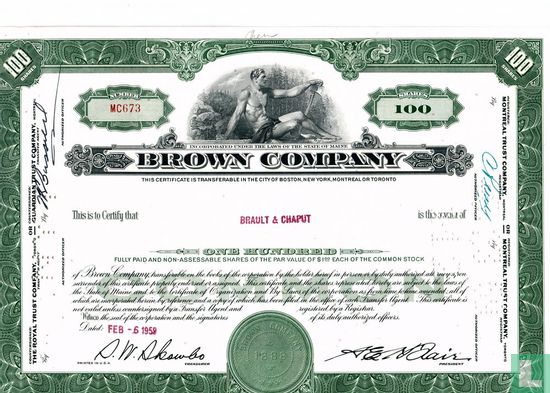Grotere foto
Brown Company, Certificate for 100 shares, Common stock
Catalogusgegevens
LastDodo nummer
1595087
Rubriek
Waardepapieren
Titel
Brown Company, Certificate for 100 shares, Common stock
Uitgevende instantie
Soort
Nominale waarde
1,00 US Dollar per aandeel
Rentepercentage (obligatie)
Branche
Land van uitgifte
Plaats van uitgifte
Jaar van uitgifte
Drukker
Oplage
Decoratieve waarde
Zeldzaamheid
Afmetingen
20,5 x 30,5 cm
Bijzonderheden
Handtekeningen facsimile.
Stuk op naam.
Ontwaarding door perforatie en/of stempeling.
This historic New Hampshire lumber mill was originally known as Berlin Mills. However, with the onset of World War I, American as well as certain foreign customers of the Berlin Mills Company became increasingly anti-German, and when the United States entered the war, a wave of anti-German hysteria swept the nation. In that frantic atmosphere, self-proclaimed super-patriots attacked anything that seemed Germanic in character. They began to associate the name of the company, Berlin Mills Company, with the capital of Imperial Germany, and began to turn their business away from the company because of the innocent coincidence of the names; after all, the company had taken its name from the railroad station, which in turn was named for the Berlin Falls of the Androscoggin River. In response to this hysteria over anything even remotely Germanic, the directors on November 30, 1917, changed the name of the firm to Brown Company (after the family name of the company’s founders). The Berlin Mills Railway operated thereafter as a department of the Brown Company but retained its distinctive original name (under which it still operated through 1991). After the war, the Brown Company continued under its new name.
Brown Company produced many chemical products. As a byproduct, the electrolytic plant that produced chlorine used in bleaching papers also produced caustic soda. In 1908 the company ceased dumping waste caustic soda into the river and instead began marketing it as White Mountain Brand Caustic Soda. As another use for chlorine, the company began producing chloroform, much in demand as an anaesthetic in military surgery during World War I, and chlorides used in making military poison gas; vulcanizing rubber by a cold process; making artificial rubber and beginning in 1918, making carbon tetrachloride. In 1921 the company began turning out liquid chlorine, used principally in water purification, bleaching, and sewage disposal. In 1924, it started producing calcium arsenate, used by cotton producers to kill the boll weevil. Until 1914 the company had allowed the byproduct hydrogen to bleed off into the air, but beginning that year the firm used it to hydrogenate vegetable oils into the consistency of lard for use as shortening or as a frying agent in domestic cooking. A competitor halted that marketing with a patent-infringement lawsuit. During the war the company had built a plant to manufacture fiber powder containers for 6-inch guns. After the war the Brown Company used this plant to produce fiber-conduit to wrap underground electric cables. The market for this product spread rapidly throughout the United States and to Europe, and the company soon had to ship a full trainload of fiber conduit to Spain.
The company was eventually acquired by the James River Corporation.

